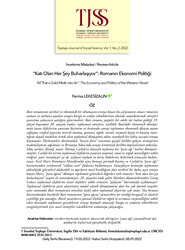“Katı Olan Her Şey Buharlaşıyor”: Romanın Ekonomi Politiği
-
Yazar
Ferma Lekesizalın
-
Tür
Makale
- Yayın Yılı 2022
-
Yayıncı
DergiPark
- Dergi Topkapı Sosyal Bilimler Dergisi / Topkapı Journal of Social Science (TJSS) 1, ( 2 ), pp.169 - 185
- Tek Biçim Adres https://hdl.handle.net/20.500.14081/2071
-
Konu Başlıkları
Para ağı
Sanayileşme
Merkantilizm
Ekonomik Dönüşüm
Parasal/Ticari Akıl
Şeyleşme
Gerçekçilik
Doğalcılık
Merkantilist ekonomiden "laissez faire" sistemine geçişle birlikte biriken sermayenin makineleşmeye yatırılarak üretimi ve ekonomiyi dönüştürmesi, sanayi toplumuna dönüşen Batı’da toplumsal ilişkilerin “para ağı” na evrilmesine yol açar. Parasal/ticari aklın yükseldiği, sermayenin ekonomik üretimdeki hakimiyetinin tamamlandığı, toplumsal ilişkilerin paranın rasyonel, soyut ve soğuk nesnelliğini taklit ettiği dönemde yükselişe geçen roman, söz konusu dönüşüme koşut söylem ve anlatı teknikleri geliştirmiştir. Romanın dönüşen toplumsal ve kişisel ilişkileri, yeni sınıfsal hiyerarşileri yansıtırken, sosyolojik bir bakış açısı benimsediğini iddia edebiliriz. Fakat asıl bakmamız gereken sosyolojinin bir bilim alanı olarak henüz tam oturmadığı bir dönemde, toplumsal dönüşümün kurmacaya bu derece çekici gelmesi ve romanın büyük bir hızla ekonomi politiğin toplumsal yönlerini, yani gözlemlenen gerçekleri olabildiğince nesnel biçimde temsil etmeye girişmesidir. Bunun nedeni belki de zamana ve mekana yayılan ve çoklu bakış açısına sahip bir anlatı türünün biçimsel ve içeriksel gelişmeye açık olmasıdır. Bu makalede, İskoç asıllı tarihçi, düşünür ve hiciv ustası Thomas Carlyle'ın “para ağı”, yani toplumsal ilişkilerin, kişisellikten arınmış, pazarlığa dayalı, metalar arasındaki soyut ilişkiyi taklit eden boyutunu anlatan kavramı --aynı zamanda Komünist Manifesto’da (1848) yer alır-- çerçevesinden bakarak romanın, Batı’da geleneksel ilişki ve hiyerarşilerin nasıl dönüştüğünü, yani gerçekliğin “katı olan her şey buharlaşıyor” şeklindeki dönüşümünü nasıl yansıttığına bakacağız.
This article offers an economic and historical examination of the ways in which the western
novel responds to the industrial and capitalist transformation of social reality. Its aim is to look
into the novelistic representations of the social experience shaped by the economic transformation of the West. Such transformation of the western society has been termed by the Scottish
historian and thinker Thomas Carlyle as ‘the cash nexus.’ Carlyle used the term to depict the
monetary domination of the British society. Inspired by Carlyle, Karl Marx has used the term
“callous cash” in The Communist Manifesto. Marx pointed out how the increasing commodification of the social reality dismantled the traditional practices, customs, and institutions in the
famous passage, “all that is solid melts into air.” One of the most eminent Marxist thinkers of
the twentieth century, Georg Lukacs defined the transformation of social relations into the relations between commodities in the modern capitalist society as “reification”. Drawing on these
concepts, the article aims to discuss the novelistic representations of the transformation of social
relations into the relations between commodities. The novel adopts innovative strategies which
have enabled it to reconstruct the ways in which social reality imitates the cold rationality of
money relations in the modern industrialized capitalist society. In the article, the novelists’ innovative use of narrative forms and techniques is pointed out as part of their attempt to refine
their critique of social reality.
-
Koleksiyonlar
Fakülteler
İktisadi İdari ve Sosyal Bilimler Fakültesi

 Tam Metin
Tam Metin

